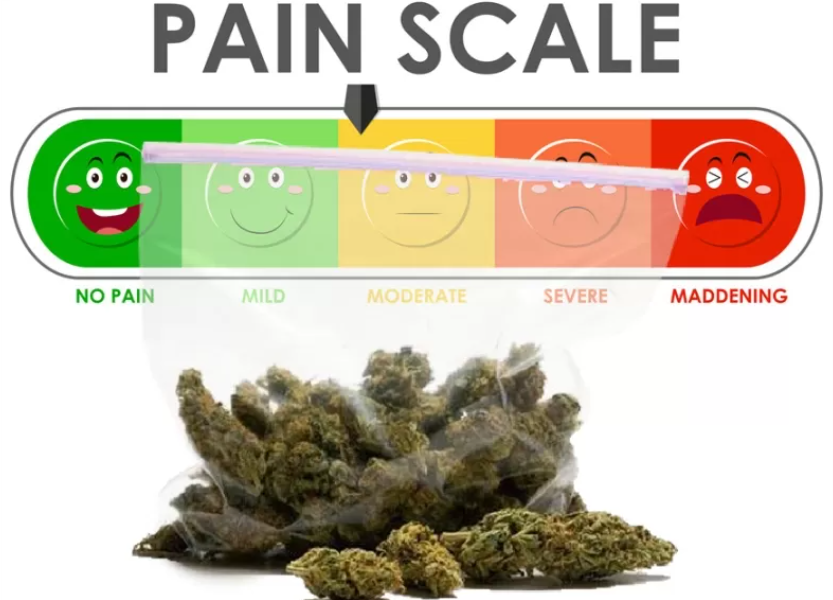Blogs
Want Pain Relief Without Getting High? CBD May Be Just as Promising as THC for Treating Pain Say New Studies

Pain Relief from Cannabis Without The High? Studies Show CBD Is Just As Promising As THC for Treating Pain
With some 50 million adults living with chronic pain, pain has become one of the most common dreaded conditions. That’s not even considering the millions of others globally who struggle with different kinds of pain: pain from the joints, chest, back, nerves, tissue damage, and more can affect anyone.
But whether pain is acute or chronic, caused by a damaged joint or long-term illness, is nonetheless always unpleasant. When it persists for too long, it can rob anyone of their quality of life, making even the most mundane everyday tasks a serious challenge. However, we can’t rely on pharmaceutical solutions to treat pain; the opioid epidemic has left thousands dead in its wake because of fatal and addictive effects, while over-the-counter medicines also have its own side effects.
Thankfully, various parts of the cannabis plant have been shown to be beneficial in treating pain.
For many years, the studies (and anecdotal evidence) surrounding the efficacy of tetrahydrocannabinol (THC) products have long been in the limelight for its powerful pain killing properties. THC is perhaps most famously known as the psychoactive compound in the marijuana plant. Countless patients have been able to find relief from a variety of pain conditions thanks to THC which can be smoked, vaporized, eaten, or used as an oil. But along with pain relief, patients also experience its psychoactive effects. While some don’t mind getting high as a way to medicate, there are simply those who prefer not to get high – and have thus shied away from using cannabis as pain medicine.
However, there is a growing body of studies showing that cannabidiol (CBD), the non-psychoactive compound in the plant, can work just as well as THC in treating pain. CBD will not get you high; in fact, it’s relaxing but has powerful anti-inflammatory properties that can address pain at its root.
What The Studies Say
One of the latest studies on the topic was conducted by researchers from the NYU Grossman School of Medicine’s Department of Orthopedic Surgery. They tested ORAVEXX, a tablet with CBD, on patients after they underwent minimally invasive rotator cuff surgery. The capsule is a buccally absorbed tab conceptualized by Orcosa, Inc., a company in life sciences.
“On the first day after surgery, patients receiving CBD experienced on average 23 percent less pain as measured by the visual analog scale (VAS) pain score compared to patients receiving the placebo, highlighting that in patients with moderate pain, CBD may render a significant benefit,” they wrote.
“On both the first and second days after surgery, patients receiving CBD reported 22 to 25 percent greater satisfaction with pain control compared to those receiving placebo. Further analysis also showed that patients receiving 50mg of CBD reported lower pain and higher satisfaction with pain control compared to patients receiving placebo. No major side effects were reported,” reads the analysis.
“There is an urgent need for viable alternatives for pain management, and our study presents this form of CBD as a promising tool after arthroscopic rotator cuff repair,” says Michael J. Alaia, MD, study lead investigator and an associate professor in the Department of Orthopedic Surgery. “It could be a new, inexpensive approach for delivering pain relief, and without the side effects of anti-inflammatory drugs like NSAIDS and addiction risks linked to opiates. Additionally, CBD has the benefit of pain relief without the psychotropic effects associated with THC or marijuana,” he said.
In 2021, a survey of patients who underwent spinal surgery in New York found that 1 in 4 patients used CBD to help them manage their symptoms. Forty-six percent of the respondents said that CBD was effective in reducing pain while 33% said it helped with sleep issues, and 20% reported reduced anxiety. “This is the first study, to our knowledge, to examine the consumption patterns and perceived effects of CBD in patients with spinal pathology,” said the authors. “This investigation demonstrates that CBD is a prevalent alternative therapy used by many patients with spine-related symptoms. As the popularity of the supplement is only expected to increase over time, spine surgeons must educate themselves on the evidence behind the use of CBD, understand its legal status, and be aware of the potential for mislabeling of ingredients,” they cautioned.
Also in 2021, a study found that CBD was effective in treating migraine pains. Individuals who struggle with migraine pains have a difficult time treating these conditions; oftentimes, the pain can be so severe that it leads to vomiting and nausea, as well as increased sensitivity to light and sound.
The 2021 study involved sending out a survey to customers who used Axon Relief’s CBD oil, which is designed specifically for treating migraine pain. The clinically validated poll analyzed the impact of headaches on the daily life of participants, as well as their ability to function. The respondents were asked to complete the survey before and after they consumed the CBD oil, which they took for 30 days. They reported 3.8 less headaches compared to the time before they consumed the CBD oil from Axon, while those with chronic migraines experienced 33% less headaches.
Conclusion
Pain patients now have more choices than ever when it comes to treating acute and chronic pain conditions. The studies on cannabidiol are surely promising to say the least, and provide an excellent alternative for patients who don’t want to get high while treating pain of many kinds.